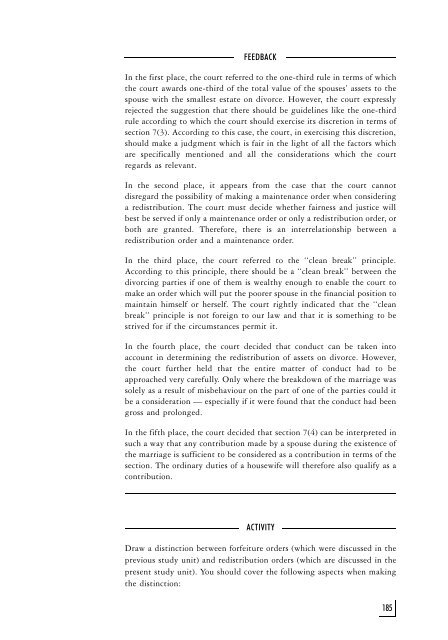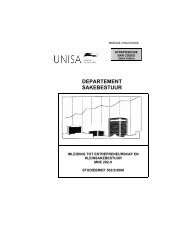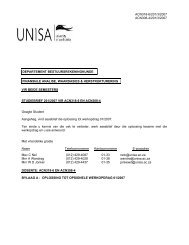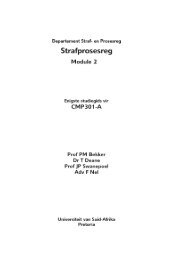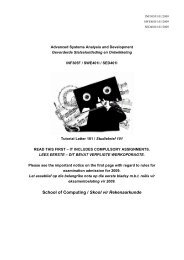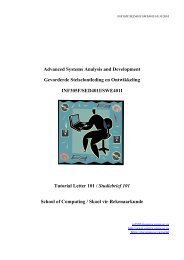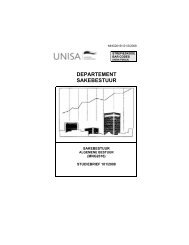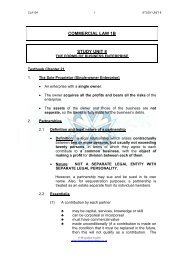key to the study guide - Name
key to the study guide - Name
key to the study guide - Name
You also want an ePaper? Increase the reach of your titles
YUMPU automatically turns print PDFs into web optimized ePapers that Google loves.
FEEDBACK<br />
In <strong>the</strong> first place, <strong>the</strong> court referred <strong>to</strong> <strong>the</strong> one-third rule in terms of which<br />
<strong>the</strong> court awards one-third of <strong>the</strong> <strong>to</strong>tal value of <strong>the</strong> spouses' assets <strong>to</strong> <strong>the</strong><br />
spouse with <strong>the</strong> smallest estate on divorce. However, <strong>the</strong> court expressly<br />
rejected <strong>the</strong> suggestion that <strong>the</strong>re should be <strong>guide</strong>lines like <strong>the</strong> one-third<br />
rule according <strong>to</strong> which <strong>the</strong> court should exercise its discretion in terms of<br />
section 7(3). According <strong>to</strong> this case, <strong>the</strong> court, in exercising this discretion,<br />
should make a judgment which is fair in <strong>the</strong> light of all <strong>the</strong> fac<strong>to</strong>rs which<br />
are specifically mentioned and all <strong>the</strong> considerations which <strong>the</strong> court<br />
regards as relevant.<br />
In <strong>the</strong> second place, it appears from <strong>the</strong> case that <strong>the</strong> court cannot<br />
disregard <strong>the</strong> possibility of making a maintenance order when considering<br />
a redistribution. The court must decide whe<strong>the</strong>r fairness and justice will<br />
best be served if only a maintenance order or only a redistribution order, or<br />
both are granted. Therefore, <strong>the</strong>re is an interrelationship between a<br />
redistribution order and a maintenance order.<br />
In <strong>the</strong> third place, <strong>the</strong> court referred <strong>to</strong> <strong>the</strong> ``clean break'' principle.<br />
According <strong>to</strong> this principle, <strong>the</strong>re should be a ``clean break'' between <strong>the</strong><br />
divorcing parties if one of <strong>the</strong>m is wealthy enough <strong>to</strong> enable <strong>the</strong> court <strong>to</strong><br />
make an order which will put <strong>the</strong> poorer spouse in <strong>the</strong> financial position <strong>to</strong><br />
maintain himself or herself. The court rightly indicated that <strong>the</strong> ``clean<br />
break'' principle is not foreign <strong>to</strong> our law and that it is something <strong>to</strong> be<br />
strived for if <strong>the</strong> circumstances permit it.<br />
In <strong>the</strong> fourth place, <strong>the</strong> court decided that conduct can be taken in<strong>to</strong><br />
account in determining <strong>the</strong> redistribution of assets on divorce. However,<br />
<strong>the</strong> court fur<strong>the</strong>r held that <strong>the</strong> entire matter of conduct had <strong>to</strong> be<br />
approached very carefully. Only where <strong>the</strong> breakdown of <strong>the</strong> marriage was<br />
solely as a result of misbehaviour on <strong>the</strong> part of one of <strong>the</strong> parties could it<br />
be a consideration Ð especially if it were found that <strong>the</strong> conduct had been<br />
gross and prolonged.<br />
In <strong>the</strong> fifth place, <strong>the</strong> court decided that section 7(4) can be interpreted in<br />
such a way that any contribution made by a spouse during <strong>the</strong> existence of<br />
<strong>the</strong> marriage is sufficient <strong>to</strong> be considered as a contribution in terms of <strong>the</strong><br />
section. The ordinary duties of a housewife will <strong>the</strong>refore also qualify as a<br />
contribution.<br />
ACTIVITY<br />
Draw a distinction between forfeiture orders (which were discussed in <strong>the</strong><br />
previous <strong>study</strong> unit) and redistribution orders (which are discussed in <strong>the</strong><br />
present <strong>study</strong> unit). You should cover <strong>the</strong> following aspects when making<br />
<strong>the</strong> distinction:<br />
185


